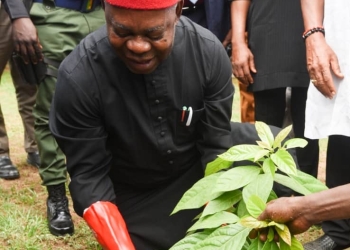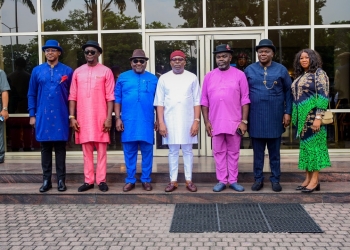By Anietie Akpan
The Federal Government’s stakeholders meeting has rejected the proposal by the Cross River state government to take over the management of the Cross River National Park (CRNP) saying, “it would be counter productive”.
This position was contained in the “Report of the Stakeholders Meeting (held in Abuja, June 27, 2024) on the Request for Transfer of Cross River National Park From The Federal Government To The Cross River State Government” and obtained by Pillar Today in Calabar.
The state government had in a letter through the Governor, Senator Bassey Otu, sought to take over the management of the CRNP from the Federal Government consequent to which the Director of Forestry Dr. Mrs Hajara Sami on the 27th June, 2024 following the directive of the Minister of Environment (HME), Mallam Balarabe Abbas Lawal convened a meeting to evaluate the feasibility and implications of the request and feedback submitted as soon as possible
After careful deliberations on the matter, the meeting unanimously concluded that it would be counter-productive and a negation of gains recorded over the years in terms of how the flora and fauna of the park has been managed sustainably and how the park has stood out as a model for carbon reservoir/emission reduction and biodiversity conservation efforts of the Federal Government.
It was also noted that CRNP comprising all its sectors (Oban and Okwangwo) remains the only protected area harbouring Nigeria’s iconic species of flora and fauna including endangered species such as the Cross River Gorilla, and Preuss’s red colobus monkey among others. The protection and preservation of these species is made possible majorly because the management of the park is under the federal authority. The current trend was also noted that, most of the state owned/initiated projects or institutions are being voluntarily handed over to the Federal Government due to the guaranteed assurance of effective management and sustainability under the federal authority. Examples are state owned airports, universities, roads, and game reserves.
The meeting also identified some factors such as; Legal and Institutional Framework, National and International Agreements and Commitments, Possible conflict with the draft Bill on National Forestry Act, Conflict with Government’s proposed innovative research and development, Conflict with the ongoing fight Against Trans-boundary Wildlife and Forest Crime, Availability of Conservation Expertise and Resources, Imminent Neglect by State Government, Risk of Sacrificing economic and ecotourism potential, and Current management capacity, to justify the need for maintaining status quo at the park.
Among other things, the stakeholders argued that “the National Park Service (NPS) operates under the NPS Act, which mandates federal oversight of all national parks in Nigeria. Thus, transferring the management of any of the parks to a state government would lead to significant legal and administrative hitches occasioned by the associated substantial amendments to the existing legal framework. Such changes could create inconsistencies, re-allocating of federal resources, legal ambiguities, and potential conflicts over jurisdiction and responsibilities in park management policies nationwide”.
Nigerian according to the stakeholders, is a signatory to a number of international conservation agreements, such as the Convention on Biological Diversity (CBD), the Convention on International Trade in Endangered Species of Wild Fauna and Flora (CITES), the Convention on Conservation of Migratory Species of Wild Animals (CMS) and the Agreement on the Conservation of Gorillas and their Habitats (CMS) and “CRNP under the Federal Government, has been hugely instrumental to the giant stride recorded by the country in the implementation of the above agreements”.
Thus, the meeting said “Nigeria is ambitiously responding to the global call to increase both terrestrial and marine areas under effective and time-tested management by at least 30% by 2030 through CRNP-based strategic engagements and collaborations. This fact has made the park a reference point attracting global attention to Nigeria as a model conservation site. Examples are the recent Biodiversity Business Project being implemented by UNESCO with the support of India
“Government as well as the various regional coordinating meeting on the 30 by 30 Kunming-Montreal Global Biodiversity Framework (KM-GBF), the current funding from USAID (through WCS) to support the management of CRNP, and the planned renewal of support for CRNP from the European Union (through WCS). CRNP has also been proposed as a World Heritage Site to UNESCO, and “Nigeria is likely to forfeit these recognitions and support should the State’s request to concede the same park to it be granted”.
The Federal Government recently created 10 additional National Parks in response to the 30 x 30 agenda, a development that led to the transfer of the management of the affected parks from the states to the Federal Government under mutual agreement.
Furthermore, it was argued that “the current management arrangement enables Nigeria to uphold its commitments under those multilateral agreements while the steady progress being recorded presently particularly as per Targets 1, 2, and 3 of the KM-GBF is sustained”.
That “it is important to note that Nigeria is still lagging behind in the realisation of this global initiative having made just about 4% of the 30% target of the Protected Area. Ceding the CRNP management to the state authorities could automatically reverse the progress and jeopardize the chances of meeting these multilateral targets.
“Only recently Nigeria joined the Regional Network of Marine Protected Area (MPA) in West Africa (RAMPAO) which promotes the conservation of MPAs and unlock opportunities for grants to countries with recognised dedicated focal points at federal level. Such opportunity would be inaccessible with a state managed park”.
The stakeholders submitted that, “the CRNP is a critical component of Nigeria’s natural heritage, requiring diligent and consistent management to preserve its unique biodiversity”.
While the concerns of the State Government are valid, the meeting said, “transferring management of the park to the state could pose significant risks. Strengthening federal-state collaboration, increased financing, and involvement of local communities in conservation activities present would adequately address concerns raised by CRS while maintaining the park’s conservation integrity.
“The fear of state taking over control of national parks is fuelled by the experience of Yankari NP which is now a shadow of its former self. We therefore cannot afford to make another mistake by transferred CRNP to the state”.
Based on the above evaluation vis-à-vis the overall interest of the Nation, the meeting “strongly recommended that the proposal by the Cross River state government to take over the management of the CRNP be rejected outright. The current federal management structure provides a robust framework for the park’s management and conservation in like with global best practices”.
Rather than transferring the management of CRNP to the State Government, the meeting specifically recommended the strengthen of Federal-State Collaboration and as an alternative to transfer, the Federal Ministry of Environment could enhance collaboration with the state. This can involve joint initiatives, co-management agreements, and capacity building programs to empower state officials while maintaining federal oversight.
This can be achieved by developing a comprehensive collaboration framework outlining specific roles and responsibilities, ensuring that federal conservation standards are upheld while involving state and local stakeholders in meaningful ways.
They also recommended that the Federal Government may increase funding to the NPS particularly for the CRNP. This could improve infrastructure, enhance anti-poaching measures, and support community-based conservation projects, addressing some of the state’s concerns without compromising the park’s management integrity.
Engage local communities in conservation efforts through education, awareness campaigns, and sustainable livelihood projects. This approach can reduce conflicts, foster local stewardship, and promote conservation-friendly economic activities without transferring management authority.
If deemed necessary, gradual policy reforms and legal amendments could be considered to increase the role of state governments in national park management. These changes should ensure that federal conservation objectives remain paramount while incorporating local interests.
Implement a robust monitoring and evaluation system to assess the effectiveness of current management practices and any collaborative initiatives. This system would help identify areas for improvement and ensure that conservation goals are consistently met.
That the state government “is advised to pursue their aspiration by upgrading the existing forest reserves or games reserves under its control to state parks and develop them into international tourism locations. A state can have as many tourism locations as they desire without necessarily taking over Federal Government responsibilities”.
They further submitted that the state government “has not demonstrated sufficient ability to conserve biodiversity as evidential in the way the state controlled Forest Reserves and Wildlife Sanctuary are being managed. There are increasing cases of indiscriminate concessions issuance and illegal logging leading to dozens of truck-loads of timber leaving the state on daily basis. However, the park remains protected simply because it is under federal control”.
The meeting was attended by two international NGOs (Wildlife Conservation Society {WCS} and Pandrillus) that have been partnering with and supporting the Ministry on the protection and conservation of endangered species within the Park; General Manager, CRNP; ACG NP and other officers from NPS; DD Legal Services Department; Director of Forestry and key officers from the Department.






